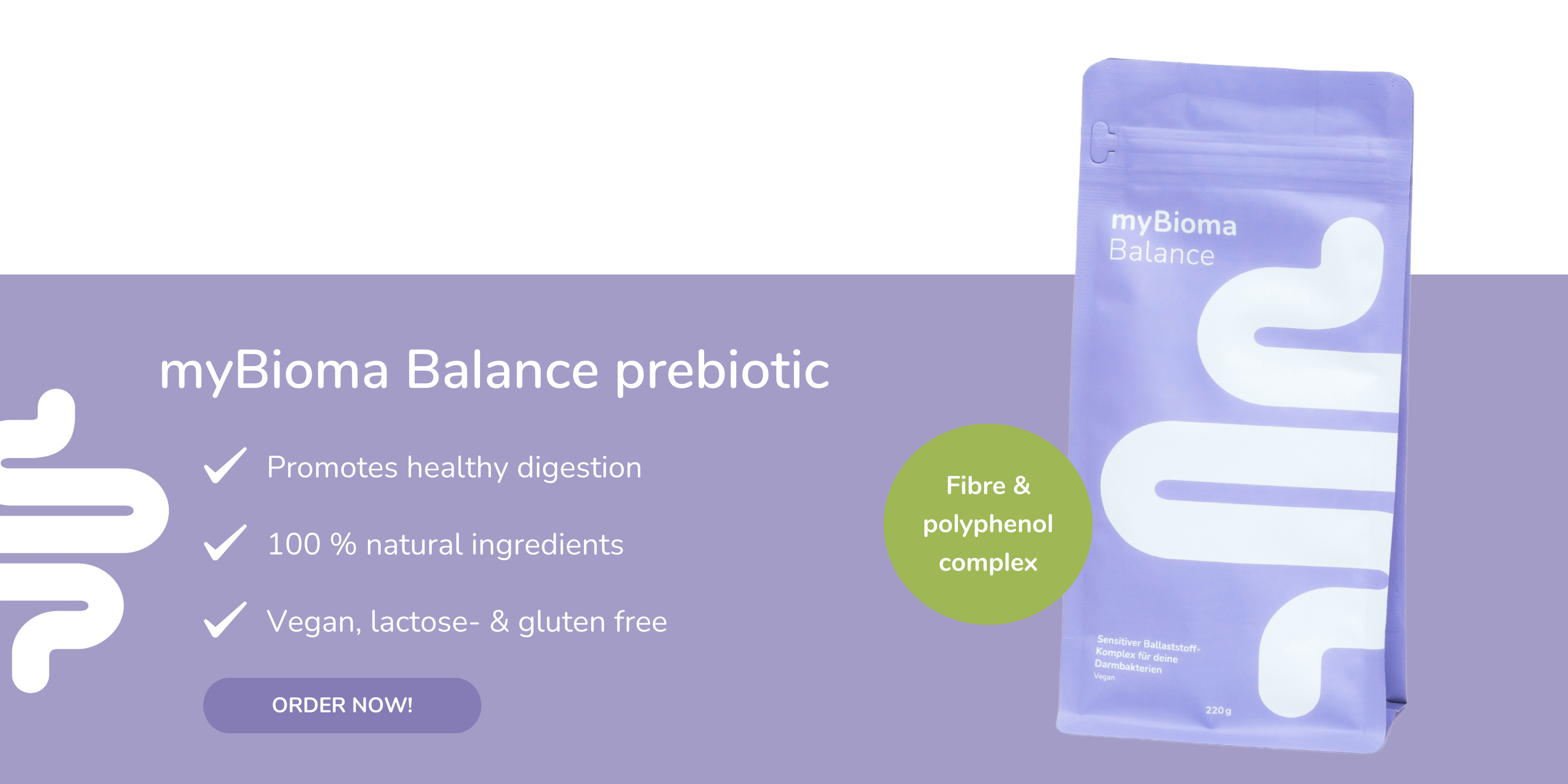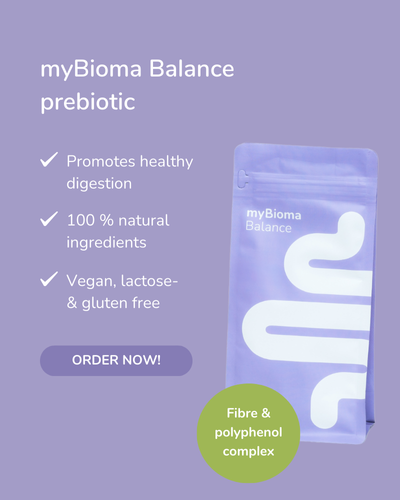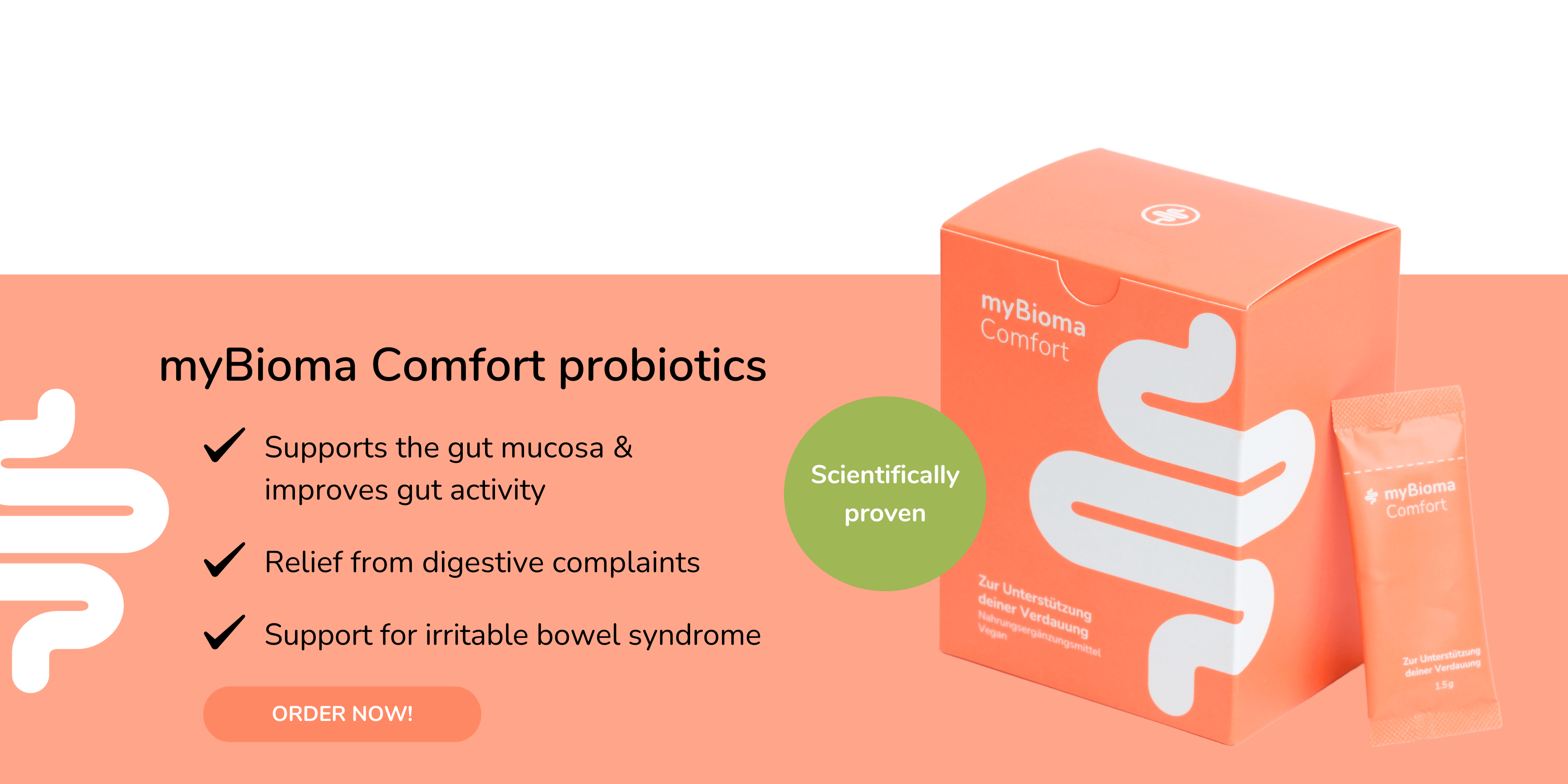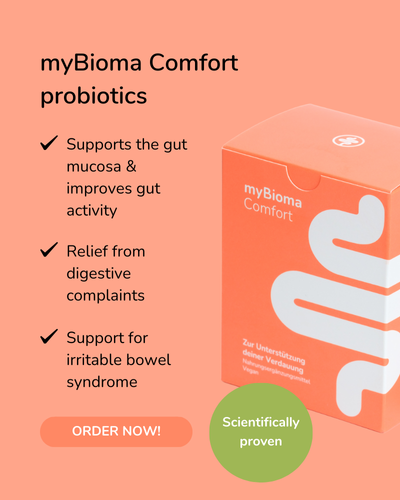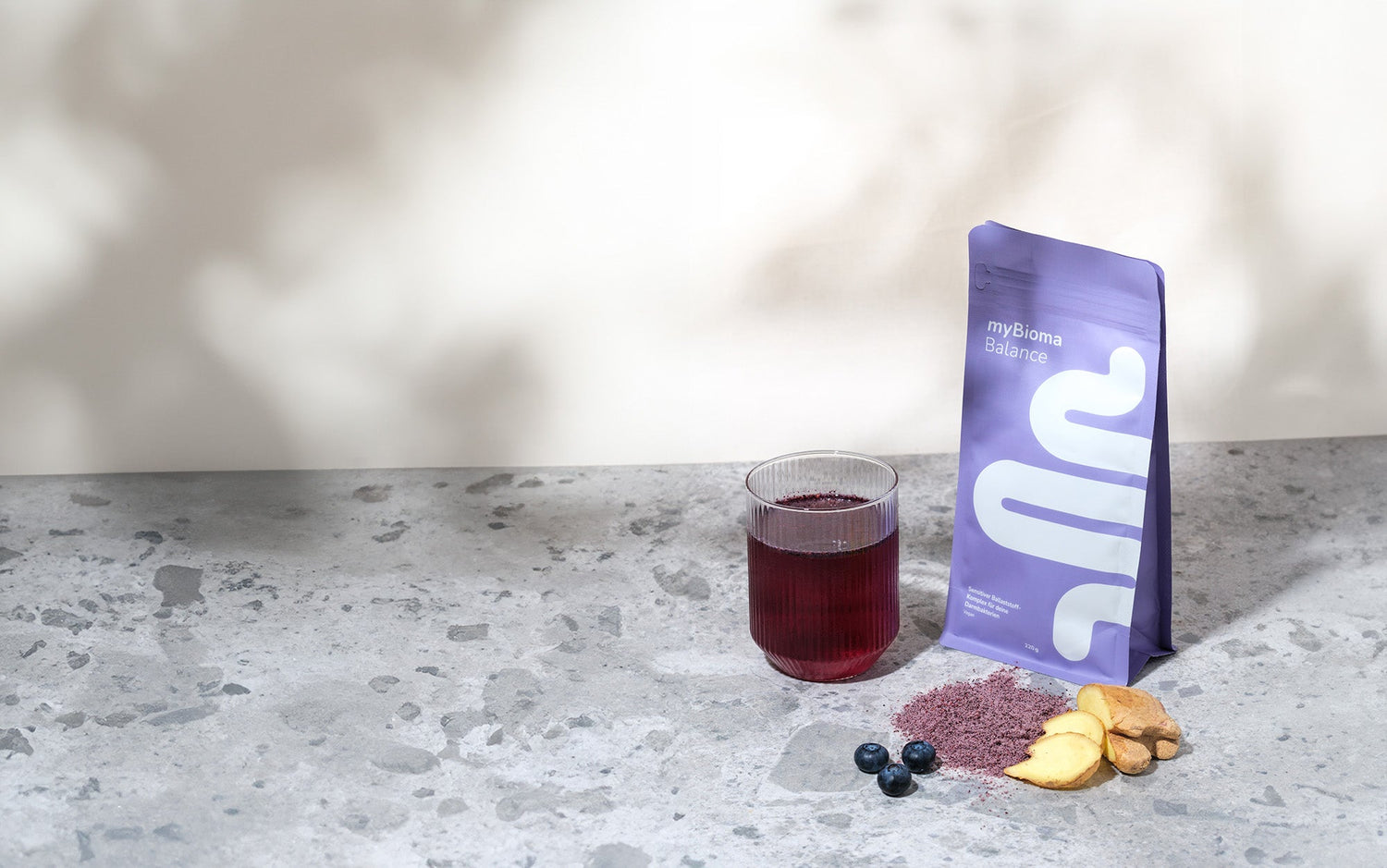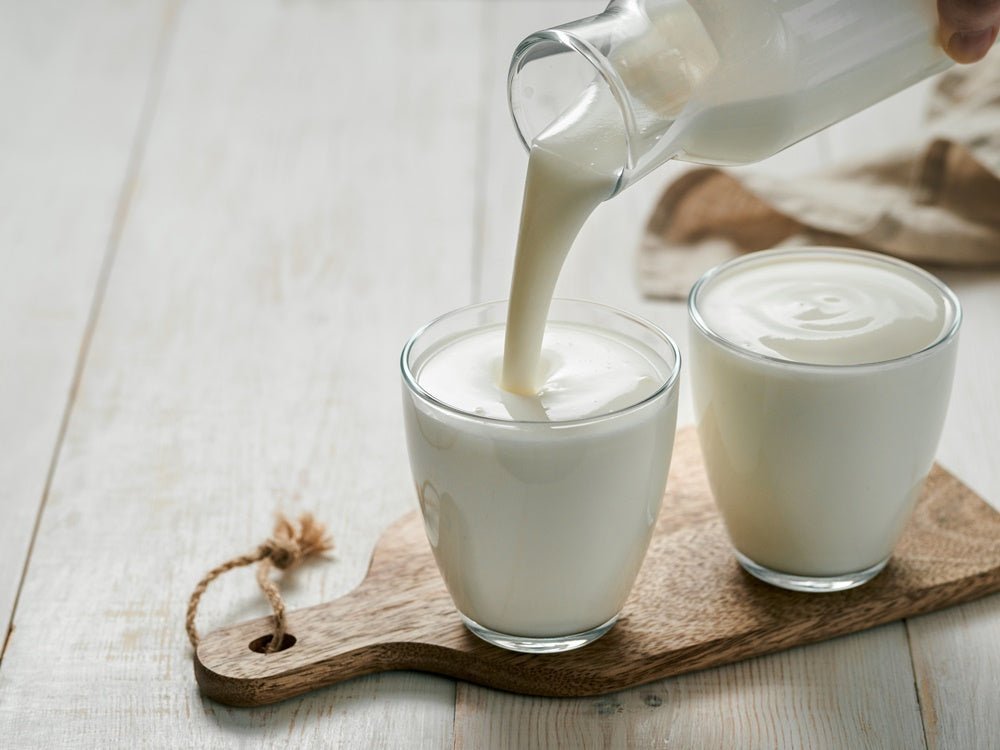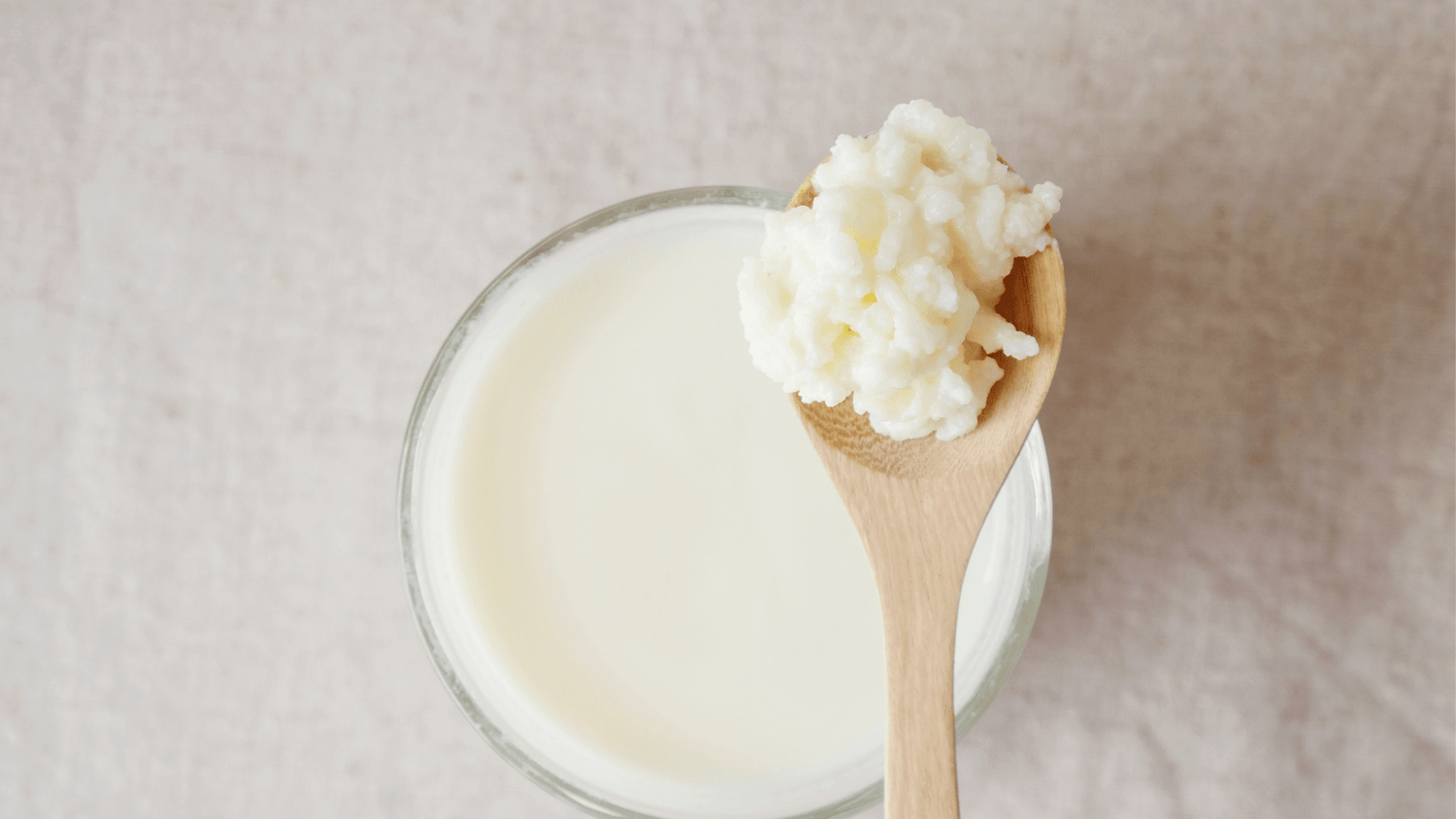Table of contents
- Briefly explained: Probiotics, prebiotics and synbiotics
- The human microbiome
- What are prebiotics?
- How do prebiotics work?
- Prebiotic foods
- What are probiotics?
- How do probiotics support gut health and the immune system?
- Is there criticism of probiotic supplements?
- Probiotic foods
- What are synbiotics?
- Conclusion
You’ve likely heard about probiotics and prebiotics and their purported benefits for our health and digestive systems. From yogurt and sauerkraut to specialized probiotic, prebiotic, and synbiotic capsules, the array of products promising to promote a healthier body seems endless. But what exactly is the difference between probiotics and prebiotics, and do they truly contribute to our health?
Briefly explained: Probiotics, prebiotics and synbiotics
Prebiotics are substances that support the growth of beneficial bacterial strains in the intestine and are fermented by them into beneficial substances (2).
Probiotics are live microorganisms that, when administered in sufficient quantities, provide health benefits to humans (1).
Synbiotics are a combination of pre- and probiotics, which contain living microorganisms (probiotics) as well as nutritional substances (prebiotics) in the form of dietary supplements (2).
The human microbiome
The gut microbiome, also known as the gut flora, consists of trillions of living bacteria and is made up of over 1000 different types of bacteria, of which new ones are constantly being discovered. Most of them are located in the lower part of the intestine, in the large intestine (3). The gut microbiome is currently a major focus of research. Advanced analysis methods, like those used by myBioma for microbiome testing, are providing new insights into the structure and function of the gut microbiome.
You’ve probably already heard that gut bacteria help us digest our food, but their benefits go much further. A healthy gut microbiome, for example, is an essential part of the immune system. Beneficial gut bacteria ensure a resilient gut mucosa that displaces pathogenic bacteria and viruses, protecting us from disease. A healthy microbiome is particularly important in childhood, as it shapes and supports the formation of the immune system (3).
Additionally, the gut microbiome further digests the food we eat and enables the release of nutrients. Whether a gut microbiome is considered healthy depends on the diversity and composition of the bacteria in the gut. A large diversity of different bacteria indicates a healthy microbiome, while the predominance of a few strains indicates an imbalance (3). The health and diversity of the gut microbiome are particularly influenced by our lifestyle (4–6):
- Taking antibiotics or other medications
- Physical activity
- Psychological stress
- Lifestyle and diet (including smoking and alcohol)
- Physical stress (intense physical training)
- Environmental factors (location, pets, cleanliness)
- Type of birth and childhood experiences
The importance of the gut microbiome becomes particularly apparent when it becomes unbalanced. Research has shown that the composition of our microbiome changes in many diseases, including (3, 7, 8):
- Obesity
- Metabolic syndrome
- Chronic inflammatory bowel diseases
- Irritable bowel syndrome
- Rheumatoid arthritis
- Gastrointestinal disorders (e.g., constipation)
- Psychiatric disorders (e.g., autism, depression, anxiety)
- Skin diseases
What are prebiotics?
Prebiotics are substances that serve as food for the beneficial bacteria of the gut microbiome and promote their growth. Unlike other food components, prebiotics are not metabolized in the upper intestinal section but reach the large intestine, where they can be optimally metabolized by your gut bacteria. In doing so, they promote the growth of the body's own beneficial bacteria (3). Prebiotics are also believed to have a protective effect against colon cancer and reduce the risk of obesity and metabolic syndrome (9).
In short, prebiotics are substances that meet the following criteria (9) :
- They are not broken down in the upper intestinal section.
- They can be fermented by the bacteria of the gut microbiome.
- They provide health benefits to humans.
- They stimulate the growth of probiotic bacteria.
- They are stable in processing and production.
Types and sources of prebiotics
Some of the most well-researched prebiotics include inulin, galactooligosaccharides, pectins, and fructooligosaccharides. These prebiotics have been proven to stimulate the growth of bifidobacteria and lactobacilli, both of which are beneficial probiotic bacteria for our health (10,11).
Prebiotics are available as dietary supplements and naturally occur in certain foods such as fruits and vegetables, grains, and legumes. You can find an overview of probiotic and prebiotic foods later in this article.
How do prebiotics work?
Beneficial and desirable bacteria ferment prebiotics, breaking them down into lactic acid, short-chain fatty acids, and other compounds during fermentation in our intestines. These by-products have a very positive effect on our health, including strengthening the immune system, reducing the risk of metabolic syndrome, and preventing diseases (9,10).
Moreover, not only are the metabolites of prebiotics beneficial, but they also increase the population of good microorganisms such as lactobacilli and bifidobacteria while reducing the number of undesirable bacteria. This positive effect on the composition of the gut microbiome allows beneficial bacteria to thrive, providing the aforementioned health benefits in the body (9,10).
In summary, prebiotics offer the following health benefits (9) :

What potential side effects can occur with prebiotics?
When taking prebiotics, gastrointestinal complaints such as flatulence, abdominal pain, stomach rumbling, or even diarrhea may occur. These side effects can often be alleviated by taking probiotics simultaneously, as they help metabolize the prebiotics and reduce the likelihood of side effects (9,12). The composition of the prebiotic ingredients plays a significant role in the occurrence of side effects. Prebiotics rich in short-chain carbohydrates are more likely to cause side effects, as they are rapidly fermented by bacteria, leading to gas production. In contrast, long-chain prebiotics ferment more slowly and are less likely to cause side effects. Therefore, it's important to ensure a sensitive formulation of the dietary supplement when purchasing prebiotics. Overall, prebiotic dietary supplements are considered safe, although individual sensitivities may vary (12).
Prebiotic foods
The most naturally occurring prebiotics are fructans. These are found particularly in plant-based foods, such as (10,13):
- Vegetables such as onions, garlic, salsify, artichokes, Jerusalem artichokes, wheat, asparagus, leeks.
- Some fruits such as bananas, citrus fruits, tomatoes, apples, plums.
- Some berries, especially blueberries (14).
- Legumes such as beans, chickpeas, lentils, etc.
- Inulin and fructooligosaccharides are often added to dairy products, desserts, baking mixes, baked goods and breakfast cereals for technical reasons.
- Honey and algae are also said to have prebiotic effects.
What are probiotics?
The FAO and WHO define probiotics as "live microorganisms which, when administered in sufficient quantities, produce a health benefit for the host" (1). This means they are live bacteria that are beneficial to our health. Probiotics come in various forms: some foods naturally contain probiotic bacteria, while others are available as specialized food supplements in liquid form, capsules, or powders, containing targeted cultures. Since these supplements are not classified as medical products but as food supplements, they can be easily purchased online.
Good to know: Food supplements are not considered medical products but fall under European food law (Regulation (EC) No. 178/2002), which means they are subject to less stringent regulations. Therefore, it's essential to carefully evaluate the reputation of the manufacturer when purchasing food supplements. A reputable manufacturer will ensure the safety of their product by having it tested by an independent laboratory for harmful substances such as toxins and heavy metals.
What types of probiotics are there?
The most well-known probiotic bacterial strains include Lactobacilli and Bifidobacteria, although there are also numerous other lactic acid bacteria and yeasts, such as certain strains of streptococci, enterococci, and bacilli. Different strains have been associated with various positive effects. For instance, Lactobacillus acidophilus may alleviate symptoms of irritable bowel syndrome, while Streptococcus thermophilus, commonly found in yogurt, exhibits anti-inflammatory properties and is believed to be beneficial in certain types of cancer (15). Our premium probiotic myBioma Balance contains the scientifically tested bacterial strain Lactobacillus plantarum 299v, which can support digestion, strengthen the immune system, alleviate bloating and irritable bowel syndrome symptoms, and even enhance iron absorption.
Probiotics are available in the form of dietary supplements, such as capsules containing specific cultures that can be taken directly, or in their natural form in probiotic (fermented) foods. For individuals who are healthy and free of symptoms, strengthening the intestinal microbiome with suitable foods is entirely adequate. However, for those looking to specifically enhance their gut microbiome, using dietary supplements may be beneficial (15). A list of probiotic foods can be found at the end of this article.
Do probiotics really contribute to a healthy gut?
Indeed! While the exact mechanisms are not fully understood, research indicates that probiotic foods and supplements, when used appropriately, can contribute to a healthier gut microbiome. Moreover, they can offer significant benefits in certain diseases (16). This has been extensively researched, particularly in conditions like irritable bowel syndrome. In such cases, several studies have demonstrated that probiotic administration can alleviate symptoms (16,17).
How do probiotics support gut health and the immune system?
It is believed that after ingestion, probiotics colonize our gut microbiome and coexist with our body's natural bacteria, contributing in various ways and positively impacting the composition of the gut microbiome, as well as other aspects such as the immune system (15).
Even though the precise mechanisms are not fully understood for all bacteria, we now understand that probiotic bacterial strains secrete bacteriocins, akin to antibiotics, which selectively eliminate unwanted bacteria and viruses in our intestines. Additionally, some produce lactic acid and hydrogen peroxide, both of which have antimicrobial properties. Undesirable microorganisms targeted include those infected with viruses that cause diseases like viral or bacterial colds (15).
A therapeutic effect of probiotics has been demonstrated in several diseases, including (15):
- Acute diarrhea
- Irritable bowel syndrome
- Bacterial and viral infections (HIV, HPV)
- Insulin resistance
- Type 2 diabetes and fatty liver disease
- Cancer
- Allergies
- Neurological diseases
- Lactose intolerance
- Diseases of the immune system
Is there criticism of probiotic supplements?
Despite the seemingly endless list of positive effects, it's crucial not to take probiotic supplements without professional advice. The primary criticism of probiotics is that each bacterial strain addresses different symptoms or clinical conditions, and the effectiveness cannot be guaranteed for every individual. Additionally, the health of the patient's gut microbiome is a significant factor, resembling an individual fingerprint unique to each person (17).
Before purchasing a probiotic dietary supplement, it's essential to clarify the purpose of its use and understand the current state of the body's microbiome. A microbiome test is a valuable tool to determine whether supplementing the intestinal microbiome with dietary supplements is truly necessary.
Do probiotics have side effects?
Probiotics can generally be considered safe supplements with no serious side effects expected. However, bloating, flatulence, diarrhea, constipation, nausea, migraines and/or allergic skin reactions may occur. Some people also experience increased thirst, especially with yeast-based probiotics. However, these symptoms usually disappear after a period of adaptation or at the latest when the use of supplements is stopped (15).
Probiotic foods
Probiotic foods are produced through prior fermentation, during which specific bacteria proliferate in the food and are now present in significant quantities. However, there is a risk that the bacterial cultures may be destroyed by further industrial processing of the product. This occurs primarily through high heat treatments, such as pasteurization. Nonetheless, the following foods are generally considered probiotic in nature (15):
- Yoghurt: Yoghurt is produced by fermenting milk – this is due to microorganisms that are added to the milk. These then provide the probiotic effect.
- Some types of cheese: Cheeses that contain probiotic cultures include blue cheese and older matured cheeses.
- Kefir: Fermented milk that contains various lactic acid bacteria and yeasts. You can easily make kefir yourself.
- Kimchi and sauerkraut: Fermented vegetables that have a long shelf life. You can find a recipe here: Simple kimchi recipe: Fermenting for intestinal health.
- Whey drinks and buttermilk: Whey is traditionally left over after cheese making, and buttermilk is left over from making butter from cream. Both contain valuable probiotic cultures.
Other foods that contain probiotics include: kombucha, tempeh, miso, pickles, naturally brewed soy sauce, boza, bors, kvass and natto.
What are synbiotics?
Synbiotics are combinations of probiotics and prebiotics, available in the form of dietary supplements. These formulations contain probiotic strains alongside their corresponding "food source". In this symbiotic relationship, probiotics and prebiotics complement each other, offering a synergistic health benefit. The most frequently utilized combination includes bifidobacteria and lactobacilli (probiotics) with fructooligosaccharides (prebiotics). Evidence suggests that synbiotics may have a more pronounced effect compared to taking probiotics or prebiotics separately (9).
What are the benefits of synbiotics (9) ?
- Deliver all the advantages of both pre- and probiotics equally.
- Ensure a healthier gut microbiome.
- Demonstrate improved liver function in cases of liver cirrhosis.
- Offer support to the immune system.
Conclusion
Practical tips for using probiotics and prebiotics:
- Combine probiotic with prebiotic foods, e.g. yoghurt with fruit.
- Look for natural, organic products.
- Try fermenting with our recipes for kefir or kimchi.
- In general, make sure you follow a balanced, gut-friendly diet.
- Try to eat a probiotic food at least every other day.
- When it comes to dietary supplements, pay attention to the manufacturer and independent laboratory samples that test for harmful substances such as heavy metals.
- When taking prebiotics, make sure they are formulated sensitively to reduce side effects.
Using probiotics, prebiotics, and synbiotics as dietary supplements offers a straightforward method of obtaining beneficial bacterial cultures and positively impacting the gut microbiome. It's prudent to consider dietary supplements, particularly if seeking relief from symptoms or aiming to restore the gut microbiome, such as after suffering from a gastrointestinal infection. To determine whether rebuilding the gut flora is necessary, it's advisable to conduct a microbiome test beforehand.
References
- Hill C, Guarner F, Reid G, Gibson GR, Merenstein DJ, Pot B, et al. The International Scientific Association for Probiotics and Prebiotics consensus statement on the scope and appropriate use of the term probiotic. Nat Rev Gastroenterol Hepatol. 2014 Aug;11(8):506–14.
- Bischoff SC. (ed.). Probiotics, prebiotics and synbiotics. Stuttgart: Georg Thieme Verlag; 2009.
- Bischoff S. The intestinal microbiome – how it affects us humans. Endo-Praxis. 2017 May;33(02):85–9.
- Cresci GA, Bawden E. Gut Microbiome: What We Do and Don't Know. Nut in Clin Prac. 2015 Dec;30(6):734–46.
- Martinez JE, Kahana DD, Ghuman S, Wilson HP, Wilson J, Kim SCJ, et al. Unhealthy Lifestyle and Gut Dysbiosis: A Better Understanding of the Effects of Poor Diet and Nicotine on the Intestinal Microbiome. Front Endocrinol. 2021 Jun 8;12:667066.
- Kim H, Sitarik AR, Woodcroft K, Johnson CC, Zoratti E. Birth Mode, Breastfeeding, Pet Exposure, and Antibiotic Use: Associations With the Gut Microbiome and Sensitization in Children. Curr Allergy Asthma Rep. 2019 Apr;19(4):22.
- Romano K, Shah AN, Schumacher A, Zasowski C, Zhang T, Bradley-Ridout G, et al. The gut microbiome in children with mood, anxiety, and neurodevelopmental disorders: An umbrella review. Good Microb. 2023;4:e18.
- Taniya MA, Chung HJ, Al Mamun A, Alam S, Aziz MdA, Emon NU, et al. Role of Gut Microbiome in Autism Spectrum Disorder and Its Therapeutic Regulation. Front Cell Infect Microbiol. 2022 Jul 22;12:915701.
- Markowiak P, Śliżewska K. Effects of Probiotics, Prebiotics, and Synbiotics on Human Health. Nutrients. 2017 Sep 15;9(9):1021.
- Wang S, Xiao Y, Tian F, Zhao J, Zhang H, Zhai Q, et al. Rational use of prebiotics for gut microbiota alterations: Specific bacterial phylotypes and related mechanisms. Journal of Functional Foods. 2020Mar;66:103838.
- Riva A, Rasoulimehrabani H, Cruz-Rubio JM, Schnorr SL, Von Baeckmann C, Inan D, et al. Identification of inulin-responsive bacteria in the gut microbiota via multi-modal activity-based sorting. Nat. Commun. 2023 Dec 14;14(1):8210.
- Davani-Davari D, Negahdaripour M, Karimzadeh I, Seifan M, Mohkam M, Masoumi S, et al. Prebiotics: Definition, Types, Sources, Mechanisms, and Clinical Applications. Foods. 2019 Mar 9;8(3):92.
- Wisker E. Prebiotics. Zentralbl Gynakol. 2003;125(12):475–9.
- Lacombe A, Li RW, Klimis-Zacas D, Kristo AS, Tadepalli S, Krauss E, et al. Lowbush Wild Blueberries have the Potential to Modify Gut Microbiota and Xenobiotic Metabolism in the Rat Colon. Aziz RK, editor. PLoS ONE. 2013 Jun 28;8(6):e67497.
- Maftei NM, Raileanu CR, Balta AA, Ambrose L, Boev M, Marin DB, et al. The Potential Impact of Probiotics on Human Health: An Update on Their Health-Promoting Properties. Microorganisms. 2024 Jan 23;12(2):234.
- Layer P, Andresen V, Allescher H, Bischoff SC, Claßen M, Elsenbruch S, et al. Update S3 guideline Irritable Bowel Syndrome: Definition, pathophysiology, diagnostics and therapy. Joint guideline of the German Society for Gastroenterology, Digestive and Metabolic Diseases (DGVS) and the German Society for Neurogastroenterology and Motility (DGNM) – June 2021 – AWMF registration number: 021/016. Z Gastroenterol. 2021 Dec;59(12):1323–415.
- Krammer H, Schmidt-Lauber M, Krammer J. Irritable bowel syndrome – new guidelines and importance of probiotics: An update on the gut-brain axis and new therapy concepts. coloproctology. 2023 Oct;45(5):340–9.



